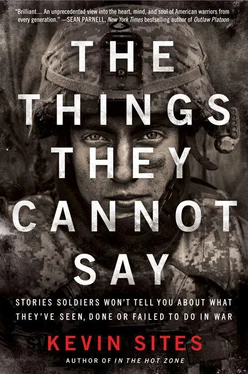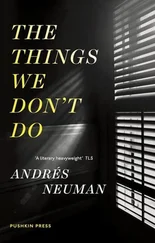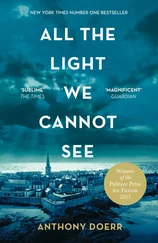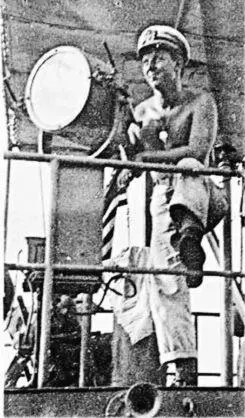
Edward Sites in the South Pacific during World War II
What I did know was what I could discern from the photographs he hung in his den and the ones he kept in boxes in the attic. They were mostly macho poses, bare chested, flag waving, not very different than the kind soldiers of today affect while deployed to Iraq or Afghanistan. But out of all of them, there is only one that’s held my imagination since I first glimpsed it as a ten-year-old boy. It’s a picture (see page 140) of my father in his khaki uniform, a .45 in his right hand, held at waist level, pointed in the direction of two rows of Japanese prisoners with their arms raised above their heads in surrender. I remember, as a boy, seeing the photograph while digging through my father’s things in the attic, but I never quite understood what the image depicted. Though I believe my brother and I may have asked him indirectly in the years after, we never got what I considered a real answer. When I went to see my parents in their retirement community, south of Tucson, a few months after I had helped create an international controversy by releasing the video I had shot as an embedded journalist of the American Marine executing a wounded, unarmed insurgent in the mosque in Fallujah, we talked about the incident, and while my parents were empathetic and supportive, I remember my father casually noting that during his deployment to the Pacific during World War II, they had orders not to take prisoners. I immediately began to wonder then about the photograph. It became an object of incongruity for me—an obsession really. My father, I had always believed, was an uncompromisingly moral man. As a small-town savings and loan executive he would return Christmas fruit baskets from clients, sending a message that he would not be swayed one way or another concerning their loan applications, whether that was their intention or not. But in this case, was my father trying to tell me that in war the same rules of civilized society didn’t apply? After all, how can you agree there are going to be rules if you’re already killing each other? But deep down this was my fear: Was this man who had seen me through my childhood, the doting and dutiful husband, weekend golfer and George Bailey–type small-town savings and loan officer, also a cold-blooded killer? Could the unarmed prisoners he held at gunpoint have become his victims as well? Could my father have done what so many others had done before, justified a summary execution of those who might’ve killed him had the roles been reversed? Over the years, I replayed his every dinner-table utterance in my mind: the anger over what the Japanese had done at Pearl Harbor, his robust defense of the dropping of atomic bombs on Hiroshima and Nagasaki. Was there, I wondered, a dark-hearted beast under this mostly kind façade he kept?
Ironically, despite my sense of duty in reporting the truth where the mosque was concerned, I never found the courage to ask him, my own father, if he was capable of acting, or indeed had acted, in the same way as the Marine in Fallujah.
As age took away some of his agility and most of his sight from macular degeneration, I watched my father, a giant of my memories, physically shrink before my eyes. His life was now mostly about comforting my mother, also a veteran, a Navy flight nurse during the Korean War, whose back had been wracked by the abuse of an unforgiving thirty-five-year career as a surgical nurse, and listening to audiobooks provided to him by the VA.
Each time I visited them I pretended it was the time I would ask him, but instead I rationalized that it was better not to kick over that rock. I lived for years with my circumstantial suspicions but never worked up the courage to ask him directly. But that didn’t stop my older brother, Tim. One Christmas when we were both visiting, Tim and I had lunch with my father in the dining room of his assisted-living residence. We were talking about the progress of my book when my brother simply blurted out, “Dad, did you ever see some real action or have to shoot and kill anyone in the war?”
I was stunned. Tim, without so much as blinking, asked the question that had haunted me, the question I was uncertain I even wanted answered. My father was silent.
He folded his arms, pausing, then cleared his throat before he spoke. “Well, you’ve seen the picture, haven’t you,” he said. Here it comes, I thought, the very moral foundation of my belief system about to crash down around me. He continued. “You know, that one of me and the Japanese,” he said, as if he had lifted it from my brain. My brother and I both nodded silently.
I waited for him to confirm my worst fears, that this kind and honest man might be no different from most when it came to war. When ordered, he could pull the trigger and kill an enemy who had made the mistake of trusting his humanity.
“Well,” he said, “the war was already over. Japan had surrendered and we were taking them to a prison camp. That’s about as close as I got.”
“You didn’t shoot them?” my brother asked.
“No,” my father said, as if it were a silly question, “I didn’t shoot anyone.” I finished my salad, trying to spear what was left of the lettuce greens on my plate. I couldn’t look my father in the eyes, even though he couldn’t really see me. I felt thoroughly ashamed that because of my own cowardice, I might’ve let him go to his grave with his son doubting the character he had never given him cause to doubt. But I knew I was also subtly disappointed that his moral nature had robbed me of a narrative irony too good to be true. But that is perhaps the greatest danger of telling war stories—our desire to make them mean something more than what they are.
Postscript
Still ashamed of my wrong assumptions, I’m somewhat relieved that because of his poor vision, my father will likely never read this book.
Part III: Things That Stain the Soul
What Can Never Be Forgotten?
There is one other wall, of course.
One we never speak of.
One we never see,
One which separates memory from madness.
In a place no one offers flowers.
THE WALL WITHIN.
We permit no visitors.
Mine looks like any of a million
nameless, brick walls—
it stands in the tear-down ghetto of my soul;
that part of me which reason avoids
for fear of dirtying its clothes
and from atop which my sorrow and my rage
hurl bottles and invectives
at the rolled-up windows
of my passing youth.
Do you know the wall I mean?
—Steve Mason, U.S. Army captain (Vietnam), poet Excerpted from the poem “The Wall Within” by Steve Mason, a decorated Vietnam combat veteran considered the unofficial poet laureate of the Vietnam War. “The Wall Within” was read at the 1984 dedication of the Vietnam Veterans Memorial in Washington, DC, and was entered in its entirety into the Congressional Record.
I saw their color and the bugs… and then I threw up.
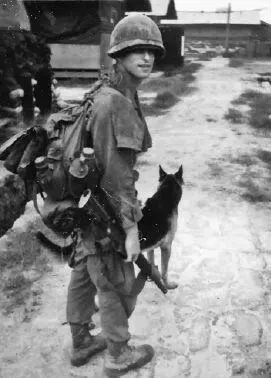
Specialist Joe Caley, U.S. Army
1st Cavalry, 25th Infantry
The War in Vietnam (1968–70)
There are a couple of distinct reactions one experiences the first time one views bodies that have been dispatched with violence. One is a morbid but compelling curiosity to see the things in all their grotesque splendor, to leave nothing to the imagination by savoring the irreparable destruction of human flesh and bone. Another is to glimpse them involuntarily and promptly puke. That was Joe Caley’s reaction the first time he went into the field in Vietnam. On his way to join his unit, the twenty-one-year-old private from Canton, Ohio, glanced at the yellowing corpses of two Vietcong fighters bloating in the sun.
Читать дальше
